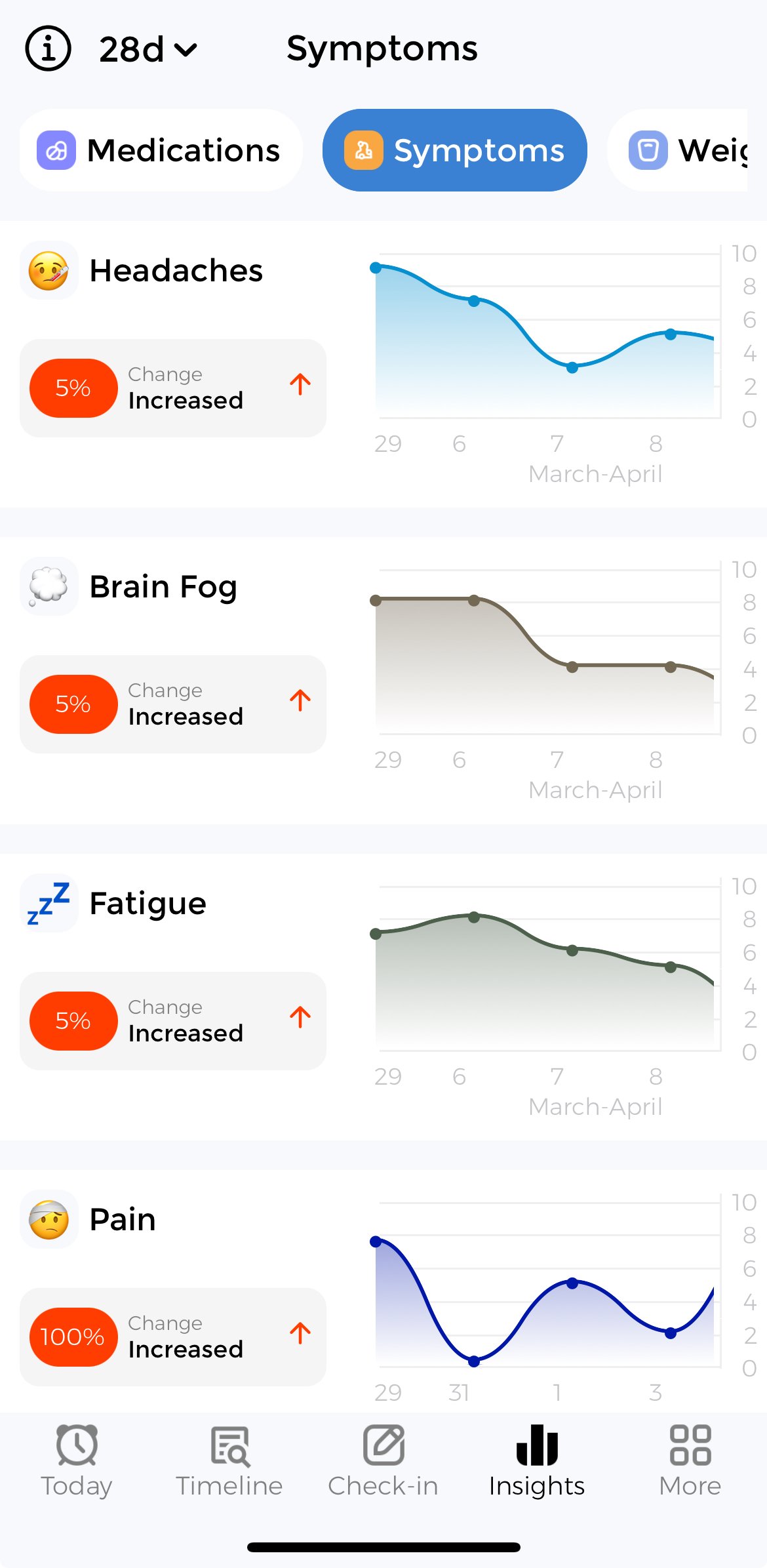Symptom Directory
Find the symptoms to track, analyze, and manage your health more effectively.
Find Your Symptom
Symptom Lookup
A
Abdominal Discomfort After Eating
1 related condition
Abdominal Discomfort After Eating Tracker View TrackerAlternating Diarrhea And Constipation
2 related conditions
Alternating Diarrhea And Constipation Tracker View TrackerB
Burning Sensation While Urinating
2 related conditions
Burning Sensation While Urinating Tracker View TrackerC
Continuing Use Despite Problems
1 related condition
Continuing Use Despite Problems Tracker View TrackerContinued Use Despite Problems
1 related condition
Continued Use Despite Problems Tracker View TrackerComparing Appearance To Others
1 related condition
Comparing Appearance To Others Tracker View TrackerCompensatory Movement Patterns
1 related condition
Compensatory Movement Patterns Tracker View TrackerD
Difficulty Understanding Conversations
1 related condition
Difficulty Understanding Conversations Tracker View TrackerDifficulty Achieving An Erection
1 related condition
Difficulty Achieving An Erection Tracker View TrackerDifficulty Starting Urination
1 related condition
Difficulty Starting Urination Tracker View TrackerDifficulty Completing Familiar Tasks
4 related conditions
Difficulty Completing Familiar Tasks Tracker View TrackerDistress In Social Situations
1 related condition
Distress In Social Situations Tracker View TrackerDifficulty Stopping The Behavior
1 related condition
Difficulty Stopping The Behavior Tracker View TrackerDifficulty Seeing Fine Details
1 related condition
Difficulty Seeing Fine Details Tracker View TrackerDecreased Contrast Sensitivity
1 related condition
Decreased Contrast Sensitivity Tracker View TrackerDifficulty Wearing Contact Lenses
1 related condition
Difficulty Wearing Contact Lenses Tracker View TrackerDifficulty Grasping Large Objects
2 related conditions
Difficulty Grasping Large Objects Tracker View TrackerDelayed Bleeding After Surgery
1 related condition
Delayed Bleeding After Surgery Tracker View TrackerDifficulty Adapting To Darkness
1 related condition
Difficulty Adapting To Darkness Tracker View TrackerDelayed Developmental Milestones
2 related conditions
Delayed Developmental Milestones Tracker View TrackerE
Electric Shock-like Sensations
1 related condition
Electric Shock-like Sensations Tracker View TrackerF
Frequent Respiratory Infections
4 related conditions
Frequent Respiratory Infections Tracker View TrackerFrequent Prescription Changes
1 related condition
Frequent Prescription Changes Tracker View TrackerFluid Accumulation In Abdomen
1 related condition
Fluid Accumulation In Abdomen Tracker View TrackerFeeling Of Incomplete Evacuation
3 related conditions
Feeling Of Incomplete Evacuation Tracker View TrackerG
H
Heart Conduction Abnormalities
2 related conditions
Heart Conduction Abnormalities Tracker View TrackerI
Increased Sensitivity To Touch
1 related condition
Increased Sensitivity To Touch Tracker View TrackerJ
K
L
Limitations In Intellectual Functioning
2 related conditions
Limitations In Intellectual Functioning Tracker View TrackerLimitations In Adaptive Behavior
2 related conditions
Limitations In Adaptive Behavior Tracker View TrackerM
N
O
P
Prolonged Bleeding After Injury
2 related conditions
Prolonged Bleeding After Injury Tracker View TrackerProlonged Nighttime Sleep Duration
1 related condition
Prolonged Nighttime Sleep Duration Tracker View TrackerPinpoint-sized Reddish-purple Spots
2 related conditions
Pinpoint-sized Reddish-purple Spots Tracker View TrackerR
Rapid Heartbeat Upon Standing
2 related conditions
Rapid Heartbeat Upon Standing Tracker View TrackerRecurring Respiratory Infections
1 related condition
Recurring Respiratory Infections Tracker View TrackerRecurrent Respiratory Infections
1 related condition
Recurrent Respiratory Infections Tracker View TrackerReduced Problem-solving Ability
1 related condition
Reduced Problem-solving Ability Tracker View TrackerReduced Functional Independence
1 related condition
Reduced Functional Independence Tracker View TrackerReduced Glomerular Filtration Rate
1 related condition
Reduced Glomerular Filtration Rate Tracker View TrackerS
Social Communication Difficulties
2 related conditions
Social Communication Difficulties Tracker View TrackerT
Temperature Regulation Problems
2 related conditions
Temperature Regulation Problems Tracker View TrackerTrouble Understanding Visual Images
1 related condition
Trouble Understanding Visual Images Tracker View TrackerTransparent Appearance Of Teeth
1 related condition
Transparent Appearance Of Teeth Tracker View TrackerU
Unusually Heavy Menstrual Flow
2 related conditions
Unusually Heavy Menstrual Flow Tracker View TrackerV
W
Withdrawal From Conversations
1 related condition
Withdrawal From Conversations Tracker View TrackerY

Why Track Your Symptoms?
Identify Patterns
Discover connections between your symptoms and potential triggers or activities.
Improve Doctor Visits
Share accurate symptom history with your healthcare providers for better decisions.
Monitor Progress
See how your symptoms change over time and how treatments are working.
Take Control
Gain confidence and peace of mind by actively managing your health.